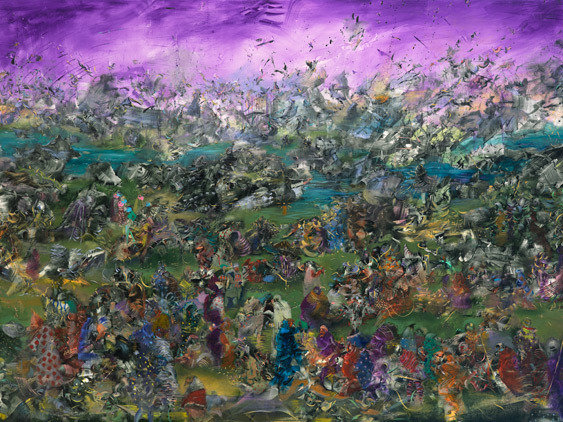Ali Banisadr
dal 2/3/2011 al 22/4/2011
Segnalato da
2/3/2011
Ali Banisadr
Leslie Tonkonow Artworks + Projects, New York
It happened and it never did. With liquid strokes that coalesce into dynamic forms Banisadr presents the grand themes of traditional history painting through a unique synthesis of opposing forces. The exhibition will feature oil paintings that range in size from miniature to monumental, all created during the past year. The title is inspired by a passage from Salmon Rushdie's novel The Satanic Verses.

Inspired by a passage from Salmon Rushdie's novel The Satanic Verses, the title of the exhibition speaks to the highly personal meditation on sociopolitical systems and the mutability of truth in Ali Banisadr's newest works. With liquid strokes that coalesce into dynamic forms – both compact and explosive – Banisadr presents the grand themes of traditional history painting through a unique synthesis of opposing forces. Abstraction and representation, memory and history, intuition and intellect, eastern and western aesthetics merge.
The exhibition will feature oil paintings that range in size from miniature to monumental, all created during the past year.
Childhood recollections of the Iran-Iraq War and a later fascination with the history of Middle Eastern conspiracies and conflicts informed the artist's first mature body of work, exhibited here in the fall of 2008 in the artist's first solo show. The individual subjects of Banisadr's new paintings are determined through a dialectical process that he describes as "a negotiation between myself and the work." Using a conventional landscape trope, he attempts to create a "personal, symbolic, and hallucinatory space," where the viewer might join him in challenging entrenched beliefs and moribund social structures.
Literature also enriches Banisadr's artistic process; the subject and title of Telluric Current (2010) derives from his reading of Umberto Eco's novel Foucault's Pendulum. Banisadr writes:
I wanted to explore Umberto Eco's idea of a secret energy flow – an electric current that moves underground or through the sea. In this painting I ask what would happen if you could tap into this energy and use it to control the ocean's currents, to disturb and interfere with life anywhere on earth? Ultimately it questions the idea of playing God.
In The Marvels of the East (2011), Banisadr contemplates the use throughout human history of institutionalized discrimination as a socio-political tool. The title of the painting derives from a medieval English text that describes the "odd, magical and barbaric" inhabitants of Egypt, India, Persia, and Babylon.
Ali Banisadr was born in Tehran in 1976. When he was twelve years old, his family left Iran, living briefly in Turkey before settling in California. He received a BFA from the School of Visual Arts, New York (2005) and his MFA from the New York Academy of Art (2007) where he was also awarded a Post-Graduate Research Fellowship (2007–2008). Since then, works by Ali Banisadr have been exhibited in Europe and the United States including two recent solo shows at Galerie Thaddaeus Ropac in Paris; Unveiled: New Art from the Middle East at the Saatchi Gallery, London; Raad O Bargh: 17 Iranian Artists at the Deutsche Bank Kunstraum, Salzburg, Austria; Epic Painting at the Samek Art Gallery, Bucknell University, Lewisberg, Pennsylvania; and, most recently Hareng Saur: Ensor and Contemporary Art at the Museum voor Schone Kunsten Gent at S.M.A.K, Ghent, Belgium
This is our second solo presentation of works by Ali Banisadr.
Leslie Tonkonow
6th Floor at 535 West 22nd Street New York NY 10011
Hours are: Tuesday through Saturday, 10:00 am to 6:00 pm.



